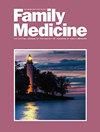Use of Signaling in Family Medicine Residency Interviewing.
IF 1.8
4区 医学
Q2 MEDICINE, GENERAL & INTERNAL
引用次数: 0
Abstract
BACKGROUND AND OBJECTIVES Although signals have been used in the residency application process by other specialties, family medicine residency directors have not previously participated. With applicant signal information available for the first time in the 2023-2024 application cycle, the current study describes family medicine residency program directors' intended use of signals and provides benchmarking descriptive data that may help inform best practices and future studies. METHODS A total of 691 of the 745 family medicine program directors in US family medicine residency programs accredited by the Accreditation Council for Graduate Medical Education were surveyed. We used ꭓ2 and Pearson correlation analyses to examine how program directors of family medicine residency programs intended to use signaling and their perceived impact of signaling on the residency interviewing process. RESULTS Most program directors indicated that applicant signals would assist them in deciding who to invite for an interview and would be a positive factor in a holistic review process. However, program directors also noted that rotation experience or geographic ties would be more powerful inducements to interview or rank a specific candidate. Program directors did not indicate a belief that signals would decrease interview season stress or workload. CONCLUSIONS Signals may play an important role in the residency application process for family medicine in 2023-2024. While signals are not anticipated to decrease application workload or stress, a signal may be an important mechanism for a specific applicant to distinguish themselves with a program.在全科住院医生面试中使用信号。
背景和目的虽然其他专业已经在住院医师申请过程中使用了信号,但家庭医学住院医师项目主任以前从未参与过。随着 2023-2024 年申请周期首次提供申请人信号信息,本研究描述了全科住院医师项目主任对信号的预期使用情况,并提供了基准描述性数据,这些数据可能有助于为最佳实践和未来研究提供信息。方法我们对美国毕业后医学教育认证委员会认证的 745 个全科住院医师项目中的 691 名全科住院医师项目主任进行了调查。我们使用ꭓ2和皮尔逊相关分析来研究全科住院医师项目主任打算如何使用信号以及他们认为信号对住院医师面试过程的影响。结果大多数项目主任表示,申请人信号将有助于他们决定邀请谁参加面试,并将成为整体审查过程中的一个积极因素。不过,项目主任也指出,轮岗经验或地域联系会更有力地促使他们对特定候选人进行面试或排序。项目主任并未表示相信信号会减少面试季的压力或工作量。虽然预计信号不会减少申请工作量或压力,但信号可能是特定申请者在项目中脱颖而出的重要机制。
本文章由计算机程序翻译,如有差异,请以英文原文为准。
求助全文
约1分钟内获得全文
求助全文
来源期刊

Family Medicine
医学-医学:内科
CiteScore
2.40
自引率
21.10%
发文量
0
审稿时长
6-12 weeks
期刊介绍:
Family Medicine, the official journal of the Society of Teachers of Family Medicine, publishes original research, systematic reviews, narrative essays, and policy analyses relevant to the discipline of family medicine, particularly focusing on primary care medical education, health workforce policy, and health services research. Journal content is not limited to educational research from family medicine educators; and we welcome innovative, high-quality contributions from authors in a variety of specialties and academic fields.
 求助内容:
求助内容: 应助结果提醒方式:
应助结果提醒方式:


